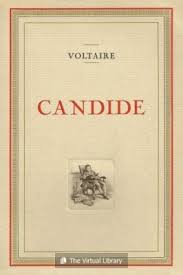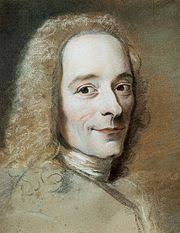Candide Page #10
Candide, ou l'Optimisme, is a French satire first published in 1759 by Voltaire, a philosopher of the Age of Enlightenment.
"And where is the reverend Father Provincial?" said Cacambo. "He is upon the parade just after celebrating mass," answered the sergeant, "and you cannot kiss his spurs till three hours hence." "However," said Cacambo, "the captain is not a Spaniard, but a German, he is ready to perish with hunger as well as myself; cannot we have something for breakfast, while we wait for his reverence?" The sergeant went immediately to acquaint the Commandant with what he had heard. "God be praised!" said the reverend Commandant, "since he is a German, I may speak to him; take him to my arbour." Candide was at once conducted to a beautiful summer-house, ornamented with a very pretty colonnade of green and gold marble, and with trellises, enclosing parraquets, humming-birds, fly-birds, guinea-hens, and all other rare birds. An excellent breakfast was provided in vessels of gold; and while the Paraguayans were eating maize out of wooden dishes, in the open fields and exposed to the heat of the sun, the reverend Father Commandant retired to his arbour. He was a very handsome young man, with a full face, white skin but high in colour; he had an arched eyebrow, a lively eye, red ears, vermilion lips, a bold air, but such a boldness as neither belonged to a Spaniard nor a Jesuit. They returned their arms to Candide and Cacambo, and also the two Andalusian horses; to whom Cacambo gave some oats to eat just by the arbour, having an eye upon them all the while for fear of a surprise. Candide first kissed the hem of the Commandant's robe, then they sat down to table. "You are, then, a German?" said the Jesuit to him in that language. "Yes, reverend Father," answered Candide. As they pronounced these words they looked at each other with great amazement, and with such an emotion as they could not conceal. "And from what part of Germany do you come?" said the Jesuit. "I am from the dirty province of Westphalia," answered Candide; "I was born in the Castle of Thunder-ten-Tronckh." "Oh! Heavens! is it possible?" cried the Commandant. "What a miracle!" cried Candide. "Is it really you?" said the Commandant. "It is not possible!" said Candide. They drew back; they embraced; they shed rivulets of tears. "What, is it you, reverend Father? You, the brother of the fair Cunegonde! You, that was slain by the Bulgarians! You, the Baron's son! You, a Jesuit in Paraguay! I must confess this is a strange world that we live in. Oh, Pangloss! Pangloss! how glad you would be if you had not been hanged!" The Commandant sent away the negro slaves and the Paraguayans, who served them with liquors in goblets of rock-crystal. He thanked God and St. Ignatius a thousand times; he clasped Candide in his arms; and their faces were all bathed with tears. "You will be more surprised, more affected, and transported," said Candide, "when I tell you that Cunegonde, your sister, whom you believe to have been ripped open, is in perfect health." "Where?" "In your neighbourhood, with the Governor of Buenos Ayres; and I was going to fight against you." Every word which they uttered in this long conversation but added wonder to wonder. Their souls fluttered on their tongues, listened in their ears, and sparkled in their eyes. As they were Germans, they sat a good while at table, waiting for the reverend Father Provincial, and the Commandant spoke to his dear Candide as follows. XV HOW CANDIDE KILLED THE BROTHER OF HIS DEAR CUNEGONDE. "I shall have ever present to my memory the dreadful day, on which I saw my father and mother killed, and my sister ravished. When the Bulgarians retired, my dear sister could not be found; but my mother, my father, and myself, with two maid-servants and three little boys all of whom had been slain, were put in a hearse, to be conveyed for interment to a chapel belonging to the Jesuits, within two leagues of our family seat. A Jesuit sprinkled us with some holy water; it was horribly salt; a few drops of it fell into my eyes; the father perceived that my eyelids stirred a little; he put his hand upon my heart and felt it beat. I received assistance, and at the end of three weeks I recovered. You know, my dear Candide, I was very pretty; but I grew much prettier, and the reverend Father Didrie,[16] Superior of that House, conceived the tenderest friendship for me; he gave me the habit of the order, some years after I was sent to Rome. The Father-General needed new levies of young German-Jesuits. The sovereigns of Paraguay admit as few Spanish Jesuits as possible; they prefer those of other nations as being more subordinate to their commands. I was judged fit by the reverend Father-General to go and work in this vineyard. We set out--a Pole, a Tyrolese, and myself. Upon my arrival I was honoured with a sub-deaconship and a lieutenancy. I am to-day colonel and priest. We shall give a warm reception to the King of Spain's troops; I will answer for it that they shall be excommunicated and well beaten. Providence sends you here to assist us. But is it, indeed, true that my dear sister Cunegonde is in the neighbourhood, with the Governor of Buenos Ayres?" Candide assured him on oath that nothing was more true, and their tears began afresh. The Baron could not refrain from embracing Candide; he called him his brother, his saviour. "Ah! perhaps," said he, "we shall together, my dear Candide, enter the town as conquerors, and recover my sister Cunegonde." "That is all I want," said Candide, "for I intended to marry her, and I still hope to do so." "You insolent!" replied the Baron, "would you have the impudence to marry my sister who has seventy-two quarterings! I find thou hast the most consummate effrontery to dare to mention so presumptuous a design!" Candide, petrified at this speech, made answer: "Reverend Father, all the quarterings in the world signify nothing; I rescued your sister from the arms of a Jew and of an Inquisitor; she has great obligations to me, she wishes to marry me; Master Pangloss always told me that all men are equal, and certainly I will marry her." "We shall see that, thou scoundrel!" said the Jesuit Baron de Thunder-ten-Tronckh, and that instant struck him across the face with the flat of his sword. Candide in an instant drew his rapier, and plunged it up to the hilt in the Jesuit's belly; but in pulling it out reeking hot, he burst into tears.
Translation
Translate and read this book in other languages:
Select another language:
- - Select -
- 简体中文 (Chinese - Simplified)
- 繁體中文 (Chinese - Traditional)
- Español (Spanish)
- Esperanto (Esperanto)
- 日本語 (Japanese)
- Português (Portuguese)
- Deutsch (German)
- العربية (Arabic)
- Français (French)
- Русский (Russian)
- ಕನ್ನಡ (Kannada)
- 한국어 (Korean)
- עברית (Hebrew)
- Gaeilge (Irish)
- Українська (Ukrainian)
- اردو (Urdu)
- Magyar (Hungarian)
- मानक हिन्दी (Hindi)
- Indonesia (Indonesian)
- Italiano (Italian)
- தமிழ் (Tamil)
- Türkçe (Turkish)
- తెలుగు (Telugu)
- ภาษาไทย (Thai)
- Tiếng Việt (Vietnamese)
- Čeština (Czech)
- Polski (Polish)
- Bahasa Indonesia (Indonesian)
- Românește (Romanian)
- Nederlands (Dutch)
- Ελληνικά (Greek)
- Latinum (Latin)
- Svenska (Swedish)
- Dansk (Danish)
- Suomi (Finnish)
- فارسی (Persian)
- ייִדיש (Yiddish)
- հայերեն (Armenian)
- Norsk (Norwegian)
- English (English)
Citation
Use the citation below to add this book to your bibliography:
Style:MLAChicagoAPA
"Candide Books." Literature.com. STANDS4 LLC, 2025. Web. 22 Jan. 2025. <https://www.literature.com/book/candide_25>.




Discuss this Candide book with the community:
Report Comment
We're doing our best to make sure our content is useful, accurate and safe.
If by any chance you spot an inappropriate comment while navigating through our website please use this form to let us know, and we'll take care of it shortly.
Attachment
You need to be logged in to favorite.
Log In